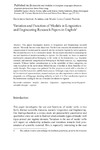Identificador persistente para citar o vincular este elemento:
https://accedacris.ulpgc.es/jspui/handle/10553/57163
| Campo DC | Valor | idioma |
|---|---|---|
| dc.contributor.author | Alonso-Almeida, Francisco | en_US |
| dc.contributor.author | Carrió Pastor, María Luisa | en_US |
| dc.date.accessioned | 2019-10-17T17:17:02Z | - |
| dc.date.available | 2019-10-17T17:17:02Z | - |
| dc.date.issued | 2017 | en_US |
| dc.identifier.isbn | 978-3-0343-2439-7 | - |
| dc.identifier.uri | https://accedacris.ulpgc.es/handle/10553/57163 | - |
| dc.description.abstract | This paper investigates modals in Linguistics and Engineering research articles. The study has two main objectives. The first one concerns the identification and categorization of modals used in research articles written in English by native speakers. The second objective is of a contrastive nature. We are much interested in measuring the use and function of modals according to register. For this study, we focus on material traditionally categorized as belonging to the realm of the humanities, e.g. linguistic research, and material categorized as belonging to the hard sciences, e.g. engineering research. Without further considerations as to the suitability of these categories, we want to explore on the motivations behind the use of modals in these branches of scientific thought. Our corpus was gathered for this purpose in mind with a selection of papers from the humanities and the hard sciences. Although corpus tools are fundamental for statistical representations, manual analyses are also important in order to detect pragmatic use of language denoting authority or lack of it. Our conclusions report on the motivations leading to the use of modals in relation to register. | en_US |
| dc.language | eng | en_US |
| dc.publisher | Peter Lang Publishing Group | en_US |
| dc.source | Evidentiality and modality in european languages : discourse-pragmatic perspectives / Juana I. Marín-Arrese, Julia Lavid-López, Marta Carretero, Elena Domínguez Romero, Mª Victoria Martín de la Rosa & María Pérez Blanco (eds.), p. 277-309 | en_US |
| dc.subject | 57 Lingüística | en_US |
| dc.subject | 5701 Lingüística aplicada | en_US |
| dc.subject.other | Variation | en_US |
| dc.subject.other | Modals | en_US |
| dc.subject.other | Function | en_US |
| dc.subject.other | Linguistics | en_US |
| dc.subject.other | Engineering research papers | en_US |
| dc.subject.other | Scientific thought | en_US |
| dc.subject.other | Register | en_US |
| dc.title | Variation and Function of Modals in Linguistics and Engineering Research Papers in English | en_US |
| dc.type | info:eu-repo/semantics/bookPart | en_US |
| dc.type | Book | en_US |
| dc.identifier.doi | 10.3726/b11226 | - |
| dc.identifier.scopus | 85033591918 | - |
| dc.contributor.authorscopusid | 56567522400 | - |
| dc.contributor.authorscopusid | 55748042600 | - |
| dc.investigacion | Artes y Humanidades | en_US |
| dc.type2 | Capítulo de libro | en_US |
| dc.date.coverdate | Agosto 2017 | - |
| dc.identifier.ulpgc | Sí | es |
| dc.description.spiq | Q1 | |
| item.fulltext | Con texto completo | - |
| item.grantfulltext | open | - |
| crisitem.author.dept | GIR Discourse, Communication and Society | - |
| crisitem.author.dept | Departamento de Filología Moderna, Traducción e Interpretación | - |
| crisitem.author.orcid | 0000-0003-4676-3831 | - |
| crisitem.author.parentorg | Departamento de Filología Moderna, Traducción e Interpretación | - |
| crisitem.author.fullName | Alonso Almeida, Francisco Jesús | - |
| Colección: | Capítulo de libro | |
Visitas
127
actualizado el 10-ene-2026
Descargas
275
actualizado el 10-ene-2026
Google ScholarTM
Verifica
Altmetric
Comparte
Exporta metadatos
Los elementos en ULPGC accedaCRIS están protegidos por derechos de autor con todos los derechos reservados, a menos que se indique lo contrario.
